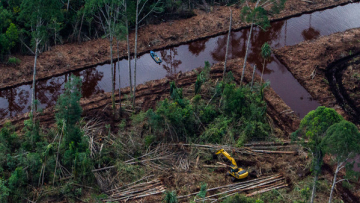Credit Suisse breaching its own forest policy by financing Indonesian rainforest devastation
Credit Suisse is breaching its own
rules on almost every count by financing pulp and paper company Royal
Golden Eagle Group (RGE Group), an analysis by BankTrack shows.
The analysis was published on the day that Greenpeace launched a petition calling on the bank to cut its ties with the company.
RGE is the owner of Asia Pacific Resources International Holdings
Limited (APRIL), named by Greenpeace as the leading driver of
deforestation for pulp in Indonesia. Last month, over 125,000 people
signed a Greenpeace petition which successfully pressured the Spanish
bank Santander to commit to stop financing APRIL until it improves its
record on deforestation.
The Dutch bank ABN Amro followed Santander early this month by giving
Greenpeace in the Netherlands a similar commitment not to finance the
company until it improves. This leaves Credit Suisse as the only known
European bank linked to the RGE Group which has not stepped away from
the company.
To date, Credit Suisse has declared that finance for the Group is
consistent with the bank's Forestry and Agribusiness Policy, of which a
summary is available on the bank's website. However, BankTrack has found
evidence that the company breaches every single one of the six
exclusion criteria in the policy.
Credit Suisse's policy describes six "excluded activities":
- Protected areas: APRIL breaches the bank's ban on doing business with forestry companies with operations in protected areas, including primary tropical moist forests and High Conservation Value forests.
- Illegal logging: APRIL has breached numerous Indonesian laws, despite the bank's ban on banking companies "where there are credible doubts as to the legality of such logging operations".
- Uncontrolled and/or illegal use of fire: Numerous fire hotspots have been found in APRIL concessions, and in 2014 the company failed a government Compliance Audit on preventing forest and land fires. One APRIL supplier was categorised as ‘extremely non-compliant'.
- Violation of local laws: APRIL has knowingly pulped natural forest wood from concessions whose licenses were issued through corrupt practices, in breach of the Credit Suisse policy not to finance forestry companies with "credible evidence of material violations" of local laws on environmental or social matters.
- Major resettlements: While the bank has committed not to finance operations that require resettlement of substantial numbers of people, APRIL's operations have required the removal of at least three villages in Indonesia's Riau Province.
- Human rights: In a number of cases, APRIL has been linked to violence used against local communities and indigenous groups protesting its operations, often by the company's own security services.
BankTrack forests campaigner Merel van der Mark said: "Credit
Suisse cannot keep standing by a company which is devastating
Indonesia's rainforest, when its forest policy should have excluded
APRIL from the outset. Other banks have done the right thing in stepping
aside from this company and building the pressure on it to stop the
chainsaws and call an immediate moratorium on deforestation, as well as
addressing its broader social conflicts and environmental impacts."
BankTrack, together with Greenpeace, Rainforest Action Network and the
Environmental Paper Network, is calling on Credit Suisse to follow the
example set by Santander and ABN AMRO in recent weeks and commit not to
provide further financial support to the RGE Group or APRIL.

